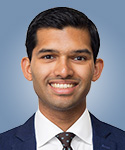March 19th, 2021
A Leap of Faith — Residency Matching
Vivek Sant, MD

Dr. Sant is a General Surgery Chief Resident at NYU Langone Health, Bellevue Hospital, and Manhattan VA in New York, NY.
Rank lists are finally in, and Match Day is here! As I think back to my own Match Day and major decision points in my life, I remember feeling the gravity of making what I felt were life-changing decisions. Looking back, I smile when I reflect on how little of what I thought was so important has actually mattered. I am equally surprised by how large a role chance has played in these decisions, yet I am extremely happy with the outcomes! While we can’t control random chance, there are certainly some ways applicants and residency programs can better assess each other. (Disclaimer: these observations reflect my own thoughts, not those of my program).
How should residency programs evaluate applicants?
What constitutes a successful resident? If you ask 10 program directors, you’ll likely get 10 different responses. A more actionable question might be what selection metrics to optimize.
Minimize attrition? Or address the root cause?
Surgery programs nationwide have a 20% attrition rate. To minimize this, residencies seek out “grit” and “resilience” in applicants. While helpful, this conceals a larger problem. The problem is underscored by recent observations that, “Only in medicine does the death of the ‘canary in the coal mine’ lead to a search for more resilient canaries.” It is time we address the root issue instead of applying band-aids.
Programs need to honestly reflect on the etiology of attrition at their institutions. Where mistreatment or toxicity is the cause, the situation must be corrected. But maybe attrition for the right reasons is acceptable and should be normalized. A resident may realize with time that the specialty or program is not right for them, or that their priorities in life have changed — and this should be ok! How do we allow for this?
- Pre-match: medical schools should ensure students experience an accurate portrayal of the field so they aren’t surprised on July 1. Exposure as a student to the rigors of being a surgical intern (e.g., taking night-time call) has been associated with feeling more prepared as a resident and with decreased feelings of burnout.
- Post-match: residents and programs should feel empowered to discover a mismatch soon and make appropriate corrections. Normalization of a process for relocating to a specialty or program that is a better fit for a resident would provide a post hoc way of dealing with this issue.
Maximize board passage rate? The ‘objective measures’
Programs select on the basis of test scores, class rank, publications, and leadership roles. This makes sense, given the association between higher Step 1 scores and likelihood of first-time board passage.
However, we are realizing that standardized tests reveal implicit bias and might disadvantage underrepresented minorities. In response, NBME is making USMLE Step 1 pass/fail. UCSF, Stanford, and Harvard no longer participate in AOA rankings. In line with a prior NEJM Chief Resident blogger, we must look to holistic measures of a person, such as their character. But how does one measure character, and how does one do so objectively and reproducibly?
The fundamental uncertainty of ‘subjective measures’
Currently, we turn to our limited experiences with the applicant during the interview process, and the specific perspectives provided by letters of recommendation. Overall, we do not yet have adequate proxies for the qualities we need to gauge.
Fit – the solution?
Programs are fundamentally looking for people who will thrive at their program and have a positive impact. In many ways, a resident’s and program’s success are inseparably coupled. A resident may find success at a certain program because of the complementary alignment of his or her strengths/weaknesses with those of the program. While interviewing for residency, I was advised to “Trust your gut, go where you perceive the best ‘fit’ between yourself and the residents/faculty/program.” Only now, after the breadth of my experiences over the past 6 years, am I beginning to appreciate the value of this advice.
What should students look for in a program?
As a student, you can’t possibly know the full extent of what you’re getting yourself into. It wasn’t until my senior years of residency that I began to appreciate the gravity of the field — the loneliness and depth of responsibility one feels for one’s patients when having to make life-altering decisions.
There are other aspects of uncertainty from a student’s standpoint. Ranking a program because of well known faculty carries the risk that they might leave before you graduate or even get there. I believe the answer to the uncertainty, on the student’s end, too, is fit. Honestly assess yourself and your core values. Then find a place whose values match yours. Seek out examples of how they have demonstrated commitment to the things you find important. And do your best to get an accurate exposure to the field, the programs, and the culture: Seek out opportunities to act as an intern on sub-internships, take overnight call, and do visiting rotations.
Lessons learned from interviewing in tech
Prior to medicine, I worked in the tech industry, where technical interviews are used as a means to assess a candidate’s ‘technical chops’. Despite improvements over the past 30 yrs, these interviews still don’t predict who will succeed or fail at a company. Only 20% of the best coders perform consistently well at technical interviews. But it seems that practice makes perfect: applicants who attend more practice and actual interviews end up performing better than those who receive less practice. As I went through residency interviews, I found myself becoming progressively more calm, confident, and truly myself. Residency applicants too would benefit from additional practice sessions until they feel they have achieved the confidence to put their best foot forward.
From applicant to interviewer — insights from the other side of the table
Applicants and programs both seek to put their best foot forward. So how does one cut through the chaff and start to really understand someone’s character? One way is to explore character-defining experiences. I understand much better now the intent behind the questions, “Tell me about a weakness” or “Tell me about a difficult experience.” These are meant to allow an applicant to showcase their character, humility, trustworthiness, work ethic, stress response, and ability to grow.
We often end up selecting people similar to ourselves. We like an applicant when we find something to connect with them about. Often, I found two interviewers would have disparate experiences with the same applicant. One person viewed the candidate as engaging and passionate, while the other found them disinterested. If you’re looking for more than “people like yourself,” you need interviewers with a variety of backgrounds and interests so that a quality applicant is not overlooked.
Conclusions
In medicine, we are comfortable making decisions based on imperfect information. The applicant selection process is no different. No matter how exhaustive the process, invariably, we must make a leap of faith. A lot of luck and chance also factors into the process. During residency interviews, I eagerly anticipated my interview at a program in Miami. However, unforeseen circumstances clouded the visit. My most lasting impressions are a late flight arrival (at 2 am on interview day), and a belligerent taxi driver at the airport! All the same, I am very happy with how the overall process turned out.
To the programs:
- Structural issues causing attrition should be fixed. Attrition for the right reasons should be destigmatized.
- Help your medical students get an accurate exposure to the field.
- Seek to better assess an applicant’s intangible traits.
- Ensure applicants meet with a variety of interviewers.
- Optimizing for fit = mutual success
To the applicants:
- Immersive sub-internship experiences can help you accurately appraise a specialty.
- Practice makes perfect!
- Get real exposure to other programs through visiting sub-internships.
- Understand a program’s values and assess its alignment with yours.
- Check your boxes and, in the end, trust your gut when looking for the right fit.
 It has been an honor to have been a part of the application process this year. Good luck to all the applicants on Match Day 2021!
It has been an honor to have been a part of the application process this year. Good luck to all the applicants on Match Day 2021!


“In medicine, we are comfortable making decisions based on imperfect information”. Well said!